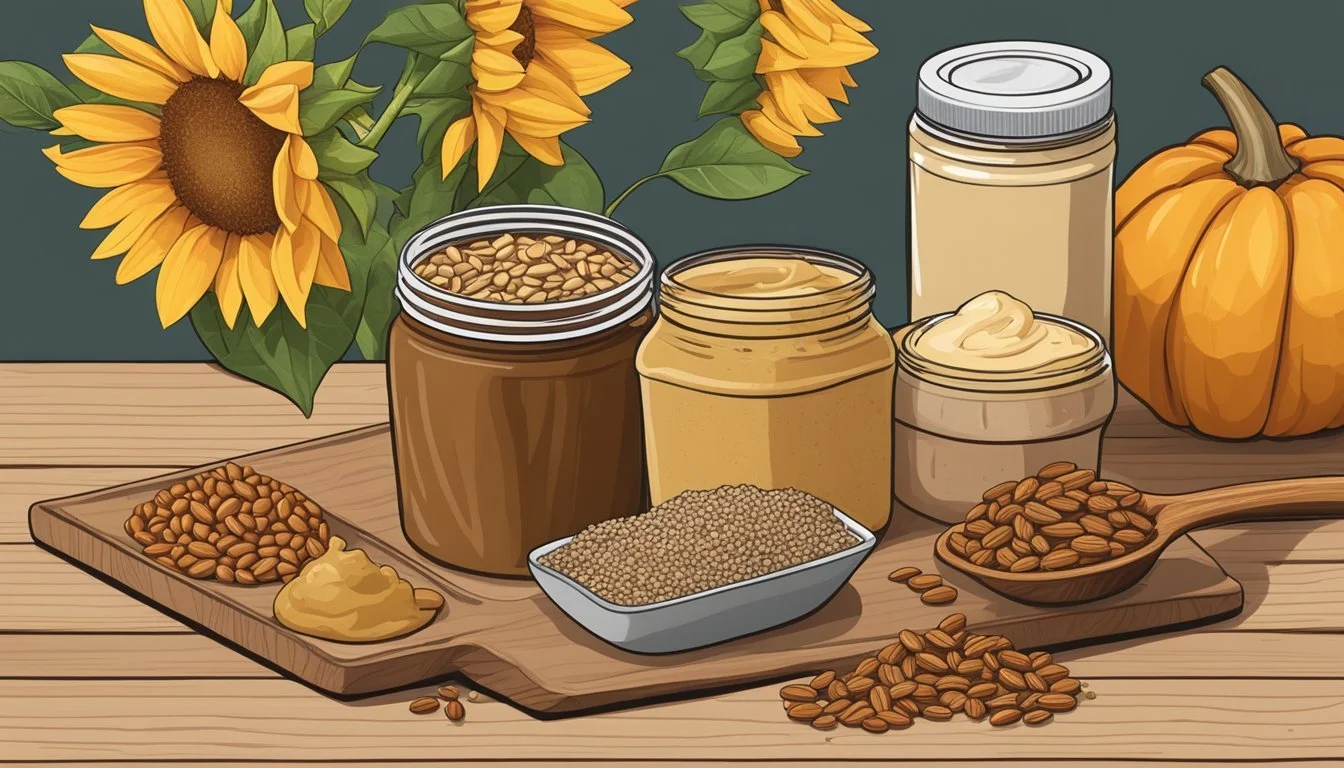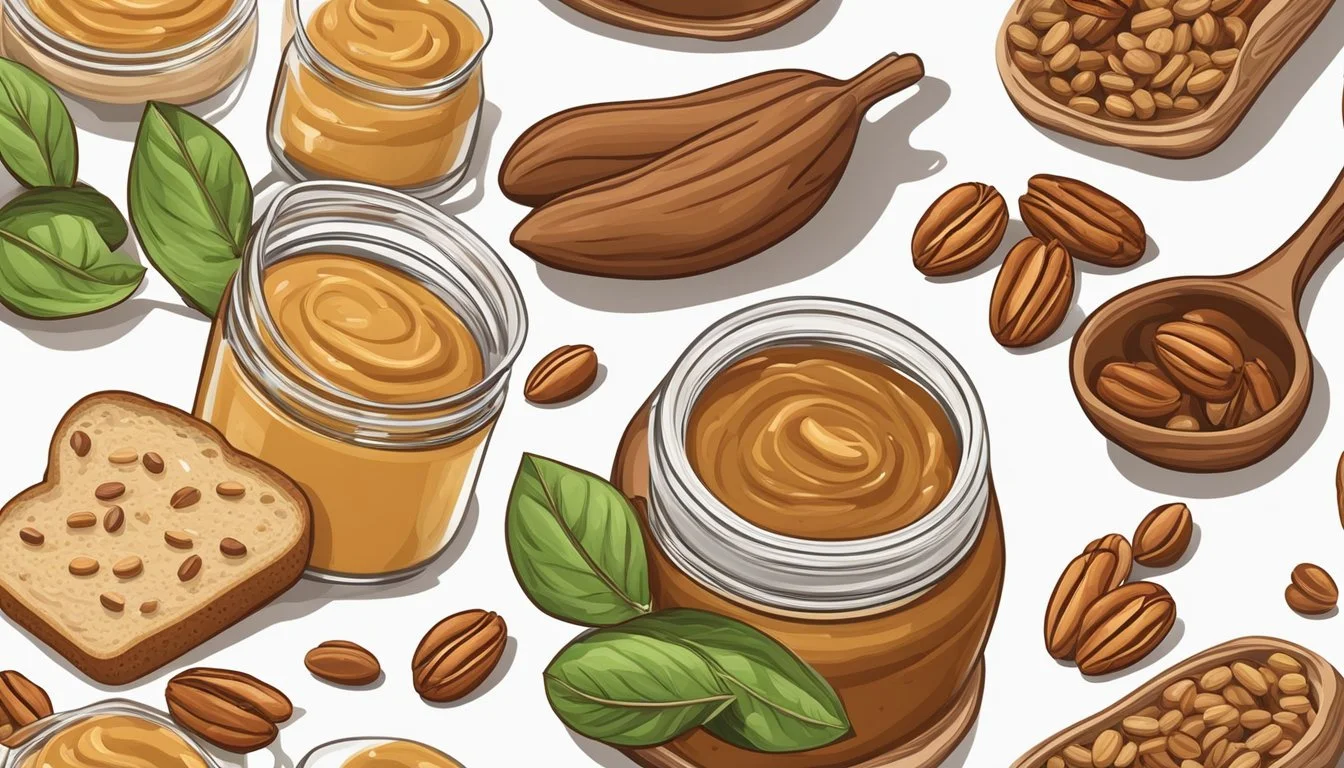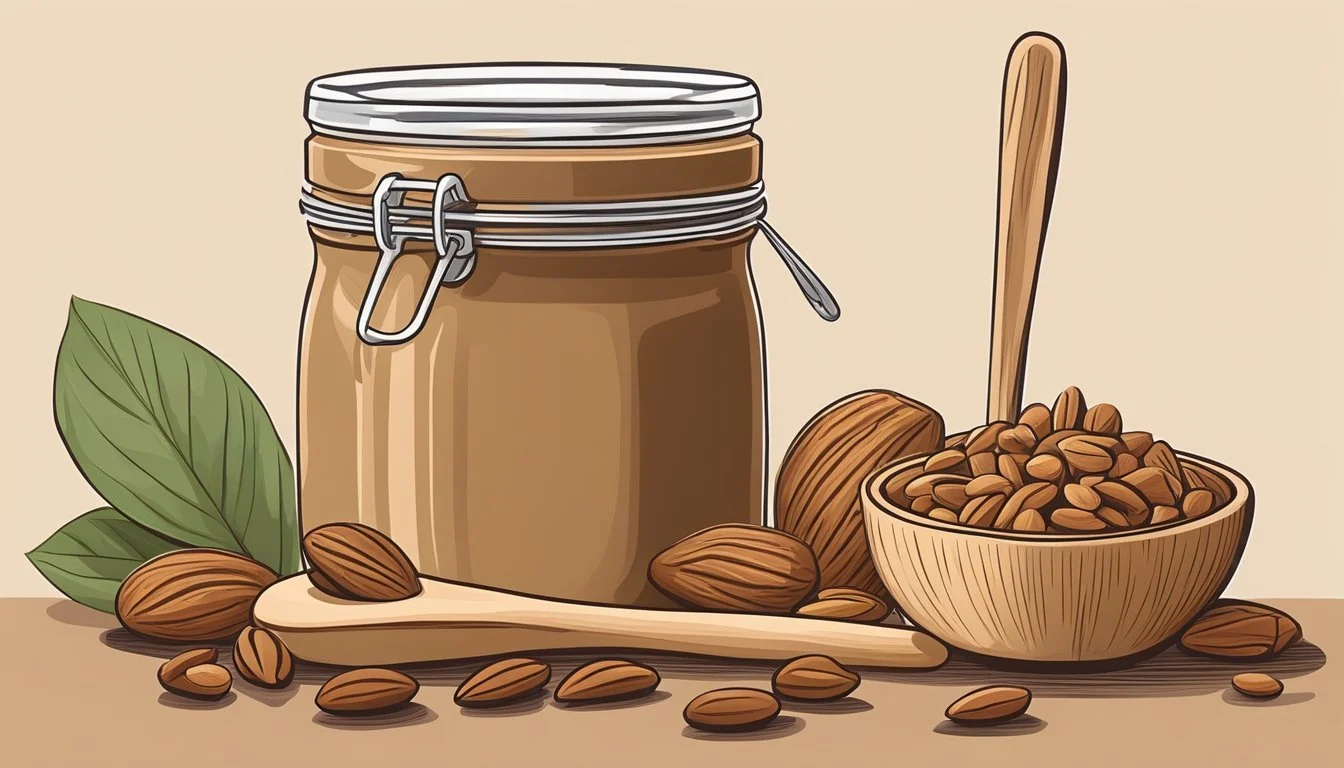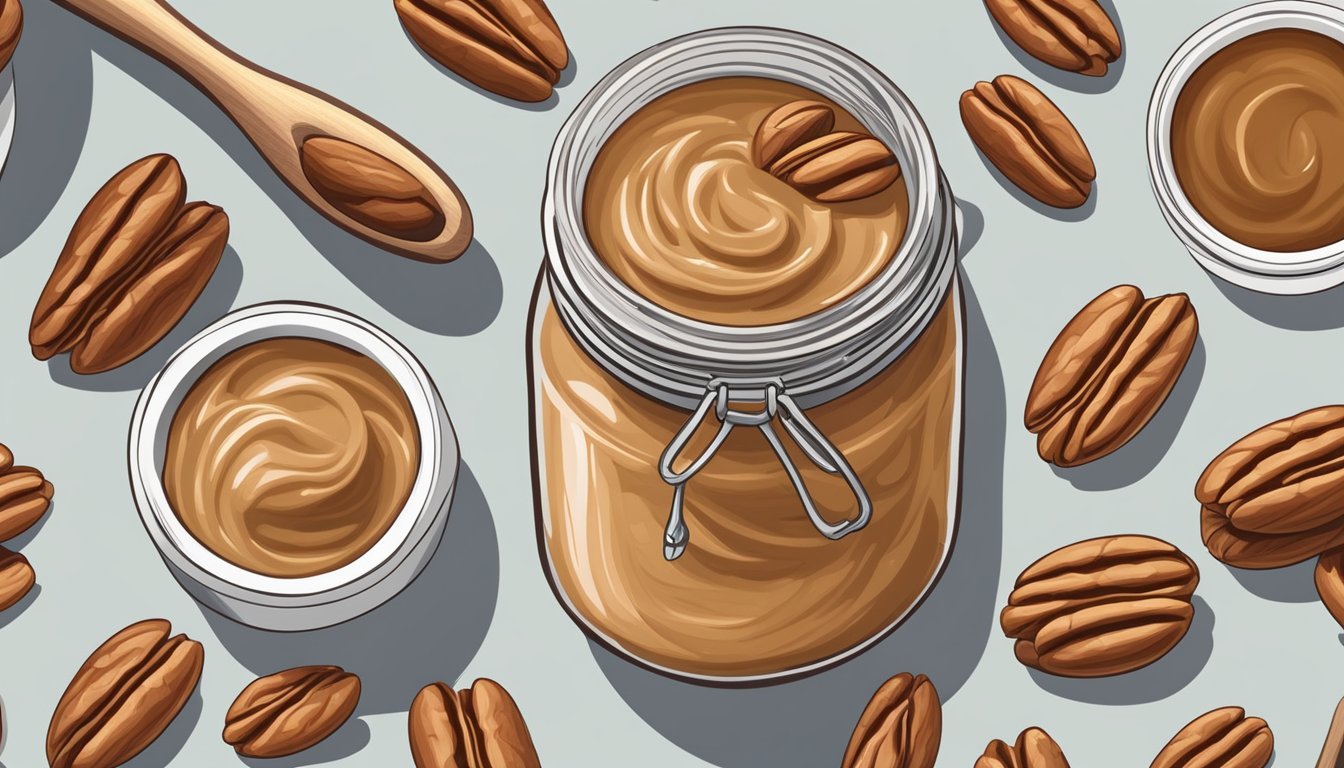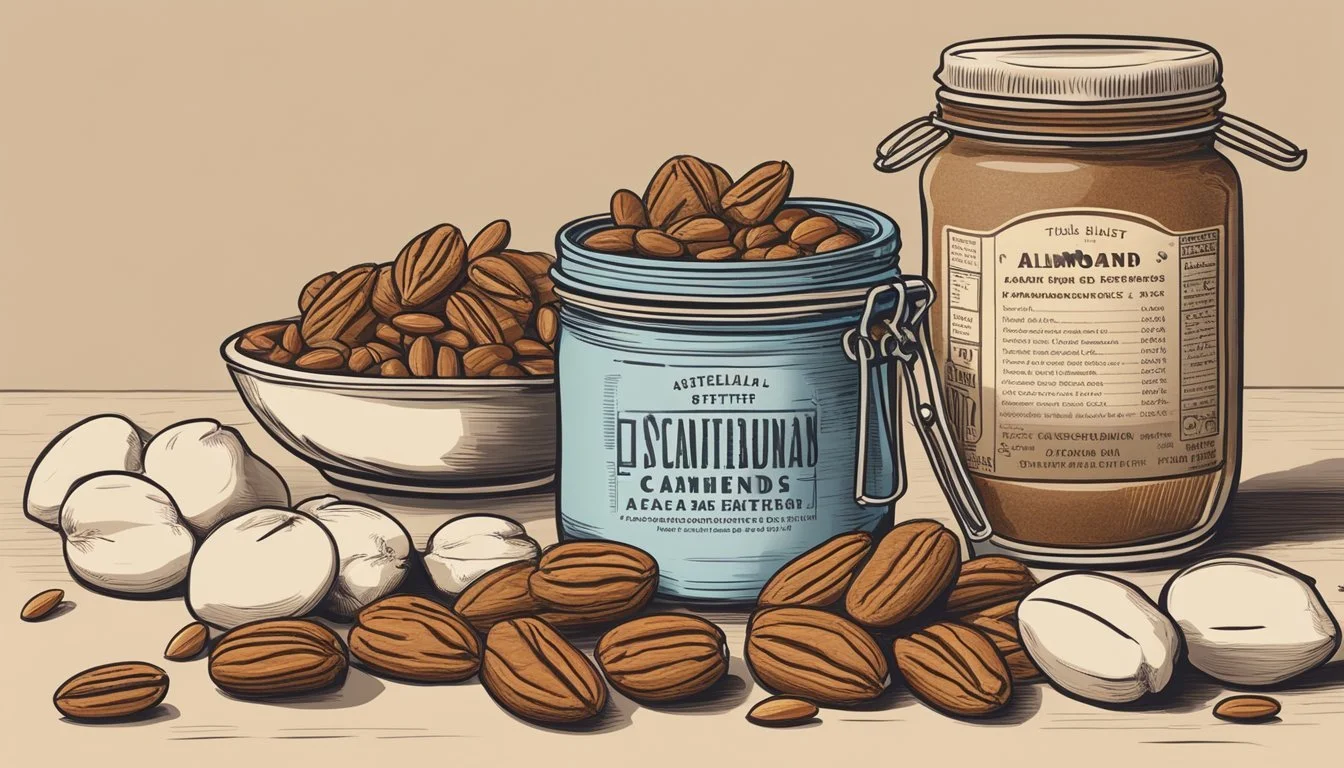Pecan Butter Substitutes
Top Alternatives for Delicious Recipes
Are you searching for the perfect pecan butter substitute? Whether due to allergies, pantry shortages, or simply looking for something new, alternatives are plentiful and can cater to various dietary needs. Walnut butter and almond butter are excellent options that offer a similar texture and richness to pecan butter. In addition to these traditional choices, there are also nut-free alternatives like sunflower seed butter and pumpkin seed butter, which provide a similar creamy consistency and are allergy-friendly.
Pecan butter is known for its distinctive, sweet-nutty flavor. If you need a straightforward swap, consider other tree nut butters like macadamia or cashew butter, which mimic the buttery texture and add a unique twist to your recipes. For those avoiding tree nuts altogether, chickpea butter and tahini (sesame seed butter) are versatile and nutritious options that can seamlessly replace pecan butter in many dishes.
Choosing the right substitute can enhance your culinary creations while catering to dietary restrictions. The key is to find a substitute that complements the other ingredients and maintains the desired texture and flavor of your dish. Dive into the rich world of pecan butter alternatives and discover new flavors that can elevate your favorite recipes.
Understanding Pecan Butter
Pecan butter is a smooth, creamy spread made from ground pecans. It has a unique texture and flavor, often described as both buttery and rich. This makes it a popular alternative to other nut butters.
Nutrient Amount Protein 2g per tbsp Fiber 2.7g per tbsp Healthy Fats High Omega-3 Fatty Acids Moderate Monounsaturated Fats High Antioxidants High
Pecans contain important nutrients like iron, magnesium, potassium, calcium, selenium, and vitamin E. These contribute to various health benefits.
Health Benefits:
Heart Health: Pecans are rich in antioxidants and monounsaturated fats. These help lower bad cholesterol levels.
Brain Function: Omega-3 fatty acids and vitamin E in pecans support cognitive health.
Cholesterol Levels: Regular consumption may improve cholesterol profiles due to healthy fats.
Flavor and Texture:
The texture of pecan butter is smooth yet slightly coarse. The flavor is deeply nutty and mildly sweet, which pairs well with both sweet and savory dishes.
Usage:
Pecan butter can be used in baking, as a spread, or in smoothies. It offers versatility and an enriching nutty flavor to various recipes.
Common Pecan Butter Applications
Pecan butter is versatile and complements a variety of dishes ranging from baked goods and desserts to savory dishes, salads, smoothies, and spreads.
Baked Goods and Desserts
Pecan butter adds a rich, buttery flavor to baked goods like pies, cookies, and cakes. It's often used in place of traditional butter or peanut butter in recipes to create moist, flavorful treats.
In pecan pie and other nut-based desserts, it enhances the nutty profile with a deep, caramel-like taste. Chocolate desserts benefit from the creamy texture and nuttiness, making pecan butter an excellent match for brownies and chocolate chip cookies. It's also a great addition to muffins, pancakes, and bread, adding a unique and delicious twist.
Savory Dishes and Salads
In savory dishes, pecan butter can be used to create rich, flavorful sauces and dressings. When incorporated into salads, it adds depth and a subtle sweetness that pairs well with greens and fruity components.
Incorporating it into savory recipes like roasted vegetables or glazed meats can elevate the flavor profile. It blends well with spices and seasonings, creating complex, savory notes that perfectly balance the richness of the dish. Pecan butter can even be spread on bread for gourmet sandwiches or used as a base in savory pancakes.
Smoothies and Spreads
Pecan butter's creamy texture and nutty flavor make it a fantastic addition to smoothies, providing an extra boost of protein and healthy fats. Blending it into fruit smoothies enhances the nutritional profile and adds a delightful, buttery taste.
As a spread, it can be used on toast, crackers, or combined with jams and honey for a delectable snack. Nut-free variations can be made with seeds for those with allergies, ensuring everyone can enjoy its benefits. Pecan butter is also suitable for creating homemade spreads, combining it with ingredients like chocolate or maple syrup for a sweet twist.
Nut-Based Pecan Butter Substitutes
When seeking alternatives to pecan butter, various nut-based options can provide similar textures, flavors, and nutritional benefits. Different nuts offer distinct profiles, making each of these substitutes suited to particular culinary uses and dietary needs.
Walnut Butter
Walnut butter stands out with its rich, earthy flavor. It contains high levels of omega-3 fatty acids, making it beneficial for heart health. The texture is creamy yet slightly gritty, which pairs well in baking and spreads. Due to its strong taste, it’s often best for savory dishes or recipes where a robust nutty flavor is desired.
Almond Butter
Almond butter is creamy, mild, and slightly sweet. It's a versatile substitute with a good balance of protein, fiber, and healthy fats. It's ideal for spreading on toast, adding to smoothies, or using in baking. Almond butter is also rich in magnesium and vitamin E, contributing to overall nutrition.
Cashew Butter
Cashew butter offers a creamy and slightly sweet profile, making it a good choice for desserts and sweet snacks. It's high in iron and zinc, supporting immune health. The smooth texture lends itself well to sauces and dips, providing a luxurious mouthfeel that pecan butter also offers.
Hazelnut Butter
Hazelnut butter has a distinct, mildly sweet flavor with a smooth texture. It's often used in desserts, particularly when paired with chocolate. Hazelnuts are rich in vitamin E and healthy fats, promoting skin health. This butter can also add depth to savory dishes due to its unique taste.
Macadamia Nut Butter
Macadamia nut butter has a rich, buttery texture and flavor that closely matches pecan butter. It’s high in monounsaturated fats, which are good for heart health. This butter works well in both sweet and savory recipes, from baking to spreads, adding a luxurious feel to any dish.
Brazil Nut Butter
Brazil nut butter is less common but offers a rich, creamy texture and a slightly earthy taste. It's extremely high in selenium, which supports thyroid function and immunity. This butter can enhance sauces, smoothies, and spreads with its unique flavor profile and nutritional benefits.
Pistachio Butter
Pistachio butter is vibrant and slightly sweet with a distinct nutty flavor. It's rich in vitamin B6 and antioxidants. This butter can be used in baking, as a spread, or mixed into yogurt. Its bright green color also adds visual appeal to dishes, making it a fun, flavorful substitute.
Pine Nut Butter
Pine nut butter has a mild, slightly creamy taste that resembles traditional nut butters like pecan. It’s rich in magnesium and iron, supporting energy and muscle function. This butter can be used in pesto sauces, spreads, and baked goods. Its unique texture and taste make it a versatile addition to various recipes.
Seed-Based and Nut-Free Alternatives
Seed-based butters are excellent substitutes for pecan butter, particularly for those with nut allergies. These options also cater to various dietary needs, providing unique flavors and nutritional benefits.
Sunflower Seed Butter
Sunflower seed butter is a great nut-free alternative. It's made from roasted sunflower seeds and offers a smooth texture similar to pecan butter.
Rich in vitamin E, this butter promotes healthier skin and eyes. It also contains monounsaturated fats, which are beneficial for heart health. Sunflower seed butter is gluten-free and suitable for individuals with allergies to nuts and tree nuts. When using it in recipes, it adds a mild, slightly sweet flavor. This option is perfect for spreads, baking, and smoothies.
Pumpkin Seed Butter
Pumpkin seed butter, derived from ground pumpkin seeds, is a nut-free choice loaded with nutrients like zinc and magnesium. These nutrients are essential for immune function and bone health.
The butter has a distinctive, earthy flavor that complements both sweet and savory dishes. It's an excellent option for allergy sufferers who need to avoid nuts. Additionally, pumpkin seed butter is rich in omega-3 and omega-6 fatty acids, which support heart and brain health. It’s a versatile addition to sauces, dips, and spreads.
Tahini (Sesame Seed Butter)
Tahini, made from ground sesame seeds, is a staple in many cuisines. It has a creamy consistency and a nutty flavor. Tahini is packed with calcium, iron, and protein, making it a nutritious pecan butter alternative.
Because it is nut-free and gluten-free, it suits various dietary restrictions. It’s particularly useful in dressings, hummus, and baked goods. Tahini's high levels of antioxidants can help reduce inflammation and promote overall health. Its slightly bitter taste mellows when mixed with other ingredients.
Chia Seed Butter
Chia seed butter, although less common, is a nut-free option that delivers high fiber and omega-3 fatty acids. These nutrients are crucial for digestive health and reducing inflammation.
The butter has a unique gel-like texture when mixed with liquids, which can add thickness to smoothies and dressings. Chia seed butter is also a source of antioxidants, which help combat free radicals in the body. It’s a versatile alternative that can be spread on toast or used as a baking ingredient.
Chia seed butter is especially suitable for allergen-conscious individuals and those looking to boost their nutritional intake.
Legume-Based Substitutes
Legume-based substitutes like peanut butter are popular alternatives to pecan butter. They offer similar qualities in terms of texture and versatility, making them suitable for a variety of recipes.
Peanut Butter
Peanut butter is a widely available substitute for pecan butter. Made from ground peanuts, peanut butter is rich in both protein and fiber.
One of its key benefits is its high nutritional value. Unsalted peanuts are often used to make healthier versions of peanut butter, which helps reduce sodium intake.
Its creamy texture and nutty flavor make it a versatile ingredient. It can be used in smoothies, desserts, and savory dishes.
Peanut butter's affordability and availability in most grocery stores make it an accessible option. Legumes like peanuts are also relatively easy to grow and harvest, contributing to their widespread use.
It’s a practical choice for those looking for a legume-based spread with similar characteristics to pecan butter.
Exotic and Less Common Substitutes
For those looking to replace pecan butter with something unique and flavorful, options like Pili Nut Butter and Coconut Butter provide interesting alternatives. Each brings its own distinct characteristics and nutritional benefits.
Pili Nut Butter
Pili nuts are a rarity in many parts of the world, making their butter a luxurious substitute. Known for their creamy texture and rich taste, pili nut butter is not only delicious but also packed with nutrients. High in magnesium and vitamin E, pili nuts contribute significantly to a balanced diet.
Due to their tropical origin, pili nuts can be more expensive and harder to find compared to more common nuts. However, they provide a unique flavor profile that pairs well with both sweet and savory dishes. Incorporating pili nut butter into recipes can add a touch of exotic flair, making it a standout ingredient.
In terms of nutritional content, pili nut butter offers high levels of healthy fats, making it an excellent source of energy. It also contains protein and essential amino acids, contributing to muscle and tissue repair. This makes pili nut butter not only a tasty but also a nutritious alternative to pecan butter.
Coconut Butter
Coconut butter, derived from the flesh of the coconut, presents a unique and versatile substitute for pecan butter. It has a naturally sweet flavor and a creamy consistency, making it ideal for desserts and baking. Coconut butter can also be used in savory recipes, adding a subtle coconut aroma.
Easy to find in health food stores and supermarkets, coconut butter can be a more accessible option than some other exotic nut butters. It is also generally more affordable. Rich in medium-chain triglycerides (MCTs), coconut butter provides a quick source of energy and has been associated with various health benefits.
In addition to healthy fats, coconut butter contains dietary fiber and small amounts of protein. It is also a good source of vitamins and minerals, including iron and potassium. These nutritional elements make coconut butter a well-rounded and appealing alternative to pecan butter for those looking to diversify their diet.
Culinary Tips for Substituting Pecan Butter
When substituting pecan butter in recipes, it’s important to consider the flavor and texture to maintain the desired consistency in your dish.
Flavor and Texture Considerations
Almond Butter: Offers a slightly milder flavor but a similar creamy texture.
Cashew Butter: Provides a sweeter and more neutral taste, making it versatile.
Peanut Butter: Delivers a stronger, more pronounced flavor and works well in both baking and cooking, though it is more robust than pecan butter.
Ratios and Consistency
1:1 Ratio: Most nut butters can substitute pecan butter in equal amounts. For example, use 1 cup of almond butter for 1 cup of pecan butter.
If the consistency needs adjustment, consider adding a small amount of neutral oil.
Baking Tips
Cookies and Cakes: Almond and cashew butters are particularly good in baking, as they blend well and retain a similar texture to pecan butter.
Consider Sweetness: When using sweeter nut butters like cashew, reduce added sugars slightly to balance the recipe.
Cooking Applications
Sauces and Dressings: Peanut butter can be a robust substitute in savory applications like sauces and dressings, adding richness and depth.
Spreads: For a smoother spread consistency, almond or cashew butters work wonders on toast or as a topping.
These tips should help ensure your recipes turn out delicious even without pecan butter.
Considerations for Pecan Butter Substitution
When substituting for pecan butter, various factors such as health and dietary concerns, flavor profiles, textural differences, cost, and availability should be taken into account to ensure the best results in both taste and nutrition.
Health and Dietary Concerns
Choosing a substitute for pecan butter requires careful consideration of dietary restrictions and health benefits. Allergies pose a significant concern; for individuals with tree nut allergies, alternatives like sunflower seed butter can be a safe option.
Pecan butter is rich in heart-healthy fats and low in cholesterol, so alternatives like almond or cashew butter, which have comparable health benefits, are advisable. Weight-conscious individuals might prefer options lower in calories and fats, such as peanut butter or various seed butters, which also offer anti-inflammatory properties.
Flavor Profiles and Textural Differences
The flavor and texture of substitutes can significantly impact the final dish. Pecan butter has a smooth, rich, and slightly sweet flavor. Almond and cashew butters provide a similarly creamy texture, though almond butter has a more pronounced nutty taste, while cashew butter is milder and slightly sweeter.
Some may consider peanut butter for its affordability and availability, but its strong, distinctive flavor can overshadow other ingredients. Another alternative is sunflower seed butter, offering a neutral taste and creamy consistency, making it suitable for recipes where the pecan flavor need not be dominant.
Cost and Availability
Cost and availability are practical considerations. Pecan butter can sometimes be expensive or hard to find. Almond and peanut butter present more budget-friendly options and are widely available in most grocery stores.
Cashew butter, while also more accessible, might be more expensive than peanut butter but less so than pecan butter. Sunflower seed butter serves as an economical and easily accessible alternative, making it a good choice for those looking for cost-effective options without sacrificing nutritional value.
Pecan-Related Facts and History
Pecans, native to North America, have a rich history intertwined with the cultural and agricultural development of the region. This section delves into both the origin of these tree nuts and the processes involved in their cultivation and harvesting.
The Origin of Pecan Nuts
Pecans are native to the Mississippi River basin and were first cultivated by Native Americans. The word "pecan" is derived from the Algonquin term "pacane," which refers to nuts that require a stone to crack.
By the 18th century, pecans had become a staple in the diets of Native American tribes and early settlers. They gained popularity for their rich flavor and nutritional value, including high levels of healthy fats and protein. Over time, pecans spread beyond their native range, finding their way into commercial agriculture.
Pecan Cultivation and Harvesting
Pecan trees thrive in the warm climates and fertile soils of the southern United States, particularly in states like Georgia, Texas, and New Mexico. These trees can take several years to mature and begin producing nuts, often requiring around a decade.
Harvesting typically occurs in the fall when the nuts have fully ripened and fallen from the trees. Mechanical shakers are now commonly used to collect the pecans efficiently. Processing involves shelling and cleaning the nuts for various products, including pecan oil and pecan flour.
Pecan cultivation is labor-intensive but yields a versatile nut celebrated in numerous culinary traditions.



